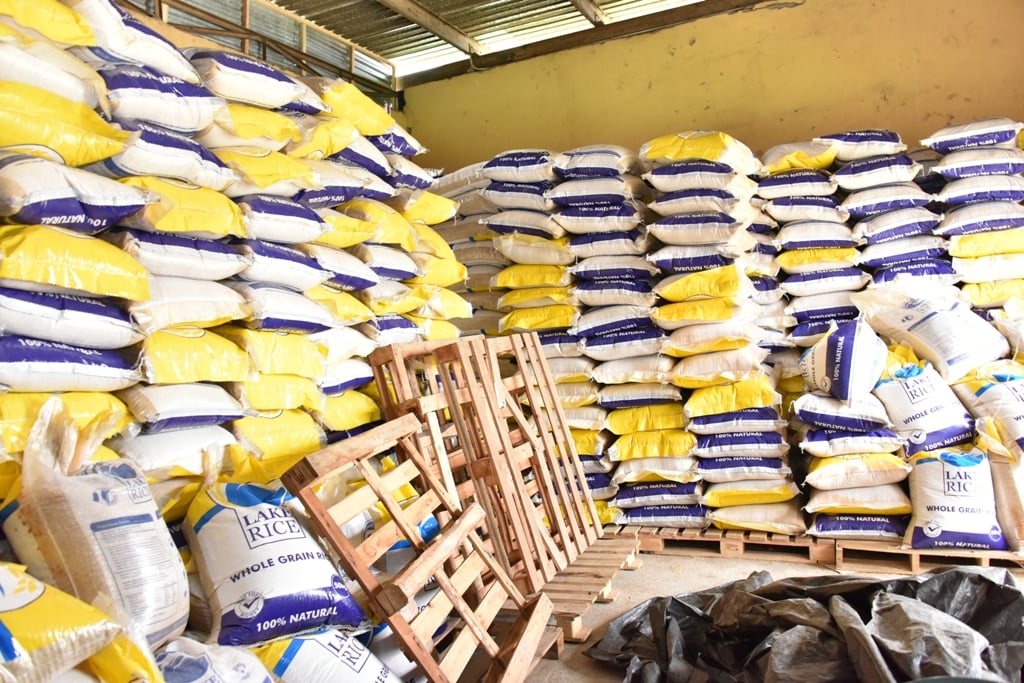BY JOSEPH OLAOLUWA
Rice is more than just a staple in Nigeria. It is prestige, a symbol of higher living and a proof of grand standing amongst Nigeria’s elite. This phenomenon is better explained why prices of rice bags spike when festivities are slowly showing up. The most coveted jollof rice is the most sought after type of food at weddings, birthday celebrations, child christening festivities and funerals. So much that some Sunday specials are incomplete without it. Rice- whether jollof or fried is a delight to many and a weekly constant for millions of Nigeria on their menus. Not excluding the rice and stew, rice and beans, Ofada rice, coconut rice and different varieties of rice that are used to satisfy these daily purposes.
Barely over a week ago, Nigeria’s Minister for Agriculture and Rural Development stated that 90 percent of the rice consumed in Nigeria is produced locally. This statement coming from the largest importers of rice across the globe was bizarre to say the least, as we sought to ascertain the truth value of the statement.
According to statistics, Nigeria has been described as the highest importer of rice globally and the largest producer of rice in Africa. It is also the most widely consumed food according to 2012 FAOSTAT data. In 2015, Nigeria spent 1 billion naira on rice importation as reported by Aminu Goronyo, the Chairman of the Rice Farmers Association of Nigeria (RIFAN) in 2017. A recent report from the United States Department of Agriculture has estimated Nigeria’s rice exports to increase by 13% to 3.4 million metric tonnes in 2019.
Advertisement
Even though the Government has implemented bans to be placed on importation,the Presidency in an Arise TV interview has called on the press to commend their efforts in encouraging local rice production; even though not much has improved thus far. Rice have reportedly been imported into Nigeria and smuggled through borders in Cotonou and Benin Republic with the major smuggling routes along Sango and Owode, a transnational link that connects Benin Republic and Ghana respectively.
Making a very misleading comment, the Nigerian Agriculture Minister, Audu Ogbeh, went further to say Nigeria was responsible for the drastic fall in rice importation from Thailand. This claim reported last year by both TheCable and Premium Times was immediately debunked by the Thailand Ambassador who found the Nigerian Minister’s comment quite misleading and alarming.
According to the report, the Agriculture minister said “just like two weeks ago, the Ambassador of Thailand came to my office and said to me that we have really ‘dealt’ with them.
Advertisement
“But I asked what did we do wrong and he said unemployment in Thailand was one of the lowest in the world, 1.2 per cent, it has gone up to four per cent because seven giant rice mills have shut down because Nigeria’s import has fallen by 95 per cent on rice alone”.
However, the diplomat said Ogbeh may have lied.
“The report is not only misleading but a distortion of the actual conversation between myself and the honourable Minister of Agriculture at the Federal Ministry of Agriculture and Rural Development on 30th January 2018, which was nothing short of positivity and optimism on both sides.
“During which I praised President Buhari’s Economic Recovery and Growth Plan (ERGP), the essence of which is the endeavour to move the country to a self-sufficiency and export-oriented economy and to that worthy cause, Thailand stands ready to work closely with the Nigerian Government in the field of technological transfer and agricultural machineries.
Advertisement
“At the same meeting, the honourable minister and I had reached the conclusion that I as Ambassador 0f Thailand to Nigeria will be working closely with the Ministry of Agriculture and rural development to establish a platform to discuss our mutual benefits in the form of MOU on Agricultural Cooperation and by forming a bilateral Working Committee toward that end.”
He added that the report could not have been farther from the truth as Thailand’s official figures demonstrate that its rice export to the world in 2017 reached 11.48 million tons worth $5.1 billion.
Nevertheless, the diplomat still wished to work with the Nigerian Minister in their new walk to a rice revolution.
Till date, discrepancies still exist amongst figures on the exact number of rice producedby Nigeria, being one of the largest importers of rice in the world, as several facts from PwC, finelib.com, AgroNigeria, ThisDay and USDA acclaim. According to AminuGoronyo, the Chairman of the Rice Farmers Association of Nigeria (RIFAN), local production of Rice as of 2017 in a Punch Newspaper report pegs Nigeria’s rice production at 5.8 million metric tonnes, against a growing consumption need of 7.9 million metric tonnes.
Advertisement
Going by that, Nigeria has been estimated to spend one billion naira on rice daily, resulting into 365 billion naira on rice alone, annually. Aminu Goronyo has tagged the rice increase of 0.3 million metric tonnes in 2017 to the Annual Borrowers Program launched by the Presidency, which translated into empowering 12 million rice producers with four million hectares of FADAMA rice land. But if only a 0.3 growth from 5.5 to 5.8 million metric tonnes is all the Buhari Administration could muster, rice self-sufficiency in 2019 could be impossible as was projected in 2016, bringing the 90% rice production claim into question.
Index Mundi tied Nigeria’s Rice production to 2.7 million metric tonnes and a consumption capacity of 7 millionmetric tonnes. Vanguard, in their Rice Revolution Feature stuck with RIFAN’s claim of 5.8 million metric tonnes and a consumption capacity of 7.9 millionmetric tonnes. Knoema raised the bar by pegging Nigeria’s consumption capacity at 9.8 millionmetric tonnes. PricewaterhouseCoopersgave Nigeria a producing capacity of 3.7 million metric tonnes and a consumption capacity of 6.4 millionmetric tonnes, accounting for 20% of Africa’s consumption. Even though Ruth Olurounbi’s Bloomberg report of November 2018 report foresees a 13% increase and 3.4 million metric tonnes increase in rice imports, the United State Department of Agriculture is what we will go with in this report, since several reports have proven inconsistent with their figures in showing how much we produce.
Advertisement
The USDA report is contrary to several claims by the Nigerian government that local rice production has increased while importation has dropped by up to 90%. The report, released in October, showed that since 2016, Nigeria had consistently milled 3,780,000 metric tonnes annually – a drop from 3,941,000 metric tonnes recorded in 2015.
Nigeria imported three million metric tonnes of rice in 2018, which is 400,000 metric tonnes more than the quantity of the product imported in 2017, according to the 2018 United States Department of Agriculture World Markets and Trade Report.
Advertisement
The report stated that Nigeria’s local rice production dropped from 2016 to 2018 compared to 2015.
It also stated that Nigeria recorded a higher consumption of rice in 2018 at 6,900,000 metric tonnes – an increase of 200,000 metric tonnes over the previous year.
Advertisement
But the CBN clarified that the volume of rice importation into Nigeria (in metric tonnes) has declined drastically in 2018, judging by figures obtained from various official sources.
Indeed, figures obtained from India and Thailand, which are dominant rice exporters to Nigeria indicated that as at September, the latter had so far exported about 5,161 metric tonnes of rice to Nigeria, while the former sold only a paltry sum of 426 as at July 2018.
While we will like to believe in the giant stride we may be making in Agriculture and in the Rice Sector, most specifically, it will be erroneous for us to belief false claims Audu Ogbeh, the Nigerian Minister for Agriculture and Rural Development has made all over the media. All his claims fact-checked are false. Nigeria has still not been able to meet her consumption need, falling below the rubicon year after year since 2015. But we can also agree that Nigeria has managed to at least produce a minimum of 3 million metric tonnes to cater for her domestic needs. That wholesome fact is true.
Nigeria imports a minimum of 2-3 million metric tonnes per year just to cater for its growing need. A goldmine, which if effectively tapped into will bring about employment, massive income generation and food for all. Nigeria has the capacity for over 3 million hectares of arable land for rice paddies. Unfortunately, none of these statistics have translated into scalable growth measures.
Till date, only 8 states heavily produce rice in Nigeria and this doesn’t mean the other 28 can’t- rice is not only grown in the Benue and Niger States, it can also be grown in well irrigated terraces but no actionable plan has been put forward to make these ideas work. Hence, the rice sustainability dream of 2019. Cementing a MoU between Lagos and Kebbi state to facilitate rice production and further distribution hasn’t yielded much fruits either. Last December the purported Lake rice was yet to be found in markets, supermarket and shops due to unnamed “technical reasons” as seen in a Guardian report. And local rice? You can literally just take your mind off that. Local rice which was sighted a few times in Jos was full of stone particles- subject to another mindless hour or two of sorting with a specific style of cooking;making the value of rice indigenously produced in Nigeria a very tough choice in many homes. What is worse off is the rice is almost as expensive as the foreign rice. Maybe #100 lesser per cup or module. In some cases, local rice tends to be costlier with no hope at the end of that tunnel as the price continues to ever be on the rise.
This current Easter festivity, rice has been a treasure to find. A few weeks before Easter, a caller on radio, 91.3 Lagos Talks FM lamented the unavailability of rice before the festivities begun. In his own experience, he had reached out to his rice dealer who decried the lack of rice in the country at the time; as the border was locked down to prevent rice smuggling. Rice smuggling, though banned via air has not piped down since the local average Nigerian consumption need is utopia for the recent beneficiaries of the Anchor Borrowing Program.
In the highly distressing phone call, he said: “Rice has been unavailable. Ask them,” he said(referring to the audience on radio and the marketers themselves), “I usually get my rice from a particular dealer but she has not been able to get me any and it is the same thing for every rice trader across Nigeria right now,” the male caller asserted, with so much conviction in his tone.
Take this as an advisory statement: No Government bans the importation of its most consumed product without setting up measures in place. Instead, it launches a research into that area and tries to use that sector to drive a revolutionary change. After a few years of research and rebuilding the sector to be self-sufficient, the reliance on importation will naturally fade away- this is only possible when the indigenously produced product is at par with international standard or maybe even greater. Not all policies are good; an import ban could bite you in the back if not well controlled. Besides, Rice production should be a yearlong affair with mechanisation of every single process to make it easier and faster.
The major reason local rice has fallen out of favour with many is because of the pebbles known to be found in it. And this occurs during rice processing when the rice paddies are strewn out, cut and left to dry on tarpaulin. This is where the whole quality is diminished, not also to add that most people are in love with the long grain rice- a speciality only the Asian continent are known for, China most especially. The long grain is not strenuous to cook; therefore it is the most sought after.
There is need to mechanise farming processes in Nigeria, starting with the number one most-consumed staple in Nigeria- Rice. If all the processes from weeding to harvesting and milling are all automated, many things will begin to improve from there and maybe some rice won’t be lost to bad yield or pest attacks. The Government should also make effort to develop rice mills across the country, avoiding over dependency on the one in Lafia for redundancy. Also, the rice should be readily available as a worthy alternative to the Thai long grain rice.
Views expressed by contributors are strictly personal and not of TheCable.






